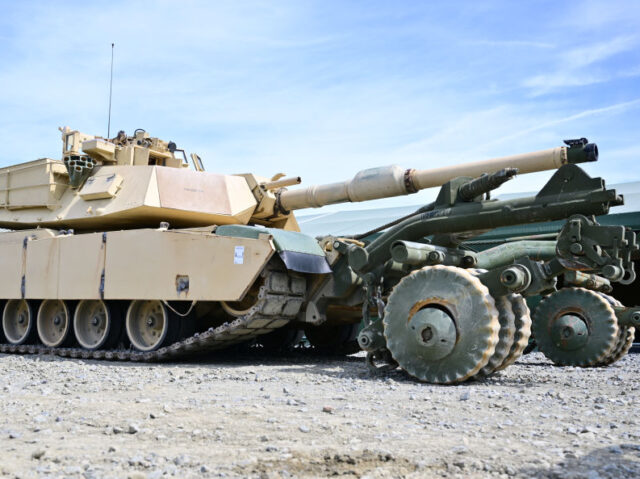Abrams battle tanks are now in Ukraine for the first time and are being prepared to “reinforce our brigades”, Ukrainian President Volodymyr Zelensky said on Monday.
Ukraine has reinforced its army with German, British, and now U.S.-made Main Battle Tanks (MBTs), with the long-promised Abrams tanks now said to be in-country for the first time. The world-class armoured vehicles were first pledged back in January, with training for Ukrainian crews commencing in NATO ally Poland in May.
France, Germany Kick Off NATO Summit With New Missiles, Tanks For Ukrainehttps://t.co/yF0ldFDsLn
— Breitbart London (@BreitbartLondon) July 11, 2023
Ukrainian President Volodymyr Zelensky made the announcement of their arrival in a media call on Monday, when he revealed: “Abrams tanks are already in Ukraine and are preparing to reinforce our brigades.”
The leader expressed his gratitude to his Western allies “for fulfilling the agreements” and said he was looking to bring more countries on board to donate further tanks in the future.
The arrival of the Abrams MBTs was confirmed by an anonymous U.S. government source cited by the New York Times who said they were the “first of 31 that the Biden administration has promised to provide”. Neither the Ukrainians or those claimed sources have said how many of those 31 have arrived so far.
Tanks a Lot! After Battlefield Losses, Ukraine Tells Germany to Send More Leopard 2shttps://t.co/4lC4nq3Lyo
— Breitbart London (@BreitbartLondon) June 12, 2023
The arrival of Abrams tanks, once said to be too technically complex, maintenance-intensive, and fuel-hungry to be really useful to Ukraine, means Kyiv has now received examples of almost all the major Western MBTs. The first to arrive were German-made Leopard 2, followed shortly by British-made Challenger 2 tanks. Conspicuous in its absence is the French Leclerc MBT, which President Macron has not “ruled out” sending, but nevertheless has not committed to.
The Abrams, like the British Challenger 2, can fire depleted uranium rounds, tank-busting ammunition that using the enormous kinetic energy of the super-dense metal to punch through enemy armour. The donation of these rounds by both nations has triggered protests by Russia, which insists the use of depleted uranium for arms and armour comes with long-lasting health impacts.
The Western nations that use the ammunition deny the health link of depleted uranium rounds to cancer. Russia has threatened to “respond accordingly” if the weapon is used against its forces.
Ukraine Gain: U.S. M1 Abrams Battle Tanks Land in Germany Ahead of Schedule https://t.co/ObRfwBNizd
— Breitbart London (@BreitbartLondon) May 12, 2023

COMMENTS
Please let us know if you're having issues with commenting.